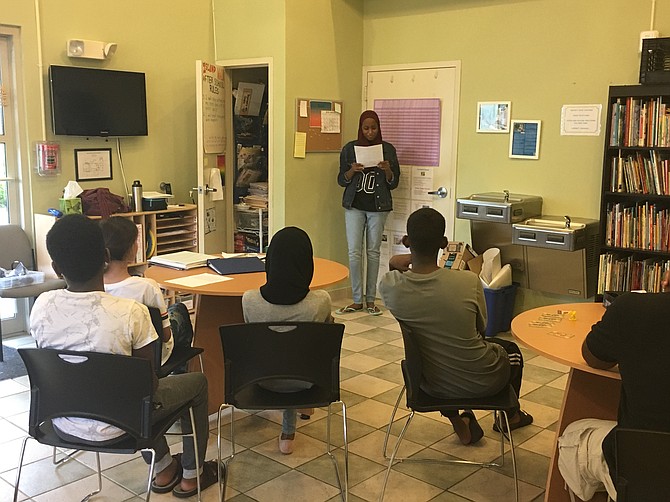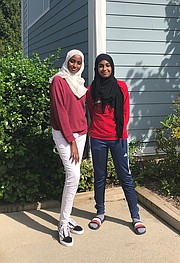Fifteen-year-old Ahlam Ali teaches youth about mental health challenges. Photo courtesy of Sharon Blacketor
“Mental health has a stigma on it, and a stigma is an uneasy feeling about the topic where people just kind of avoid it.” —Ahlam Ali, 15, of Reston
When the Island Walk community in Reston applied for and received a grant from Fairfax County for a teen-led suicide prevention and mental health initiative, two 15-year-olds, Ahlam Ali and Ayesha Abdullahi, were chosen as leaders.
“We had two of our teens plan and execute the whole program,” said Maggie Parrott, a youth specialist in the Island Walk community. “Me and my boss, Sharon, were here to supervise if they needed any extra help, but we were just sitting in the background, and they led it all. They did a really, really amazing job.”
For four weeks this summer, Ali and Abdullahi led classes for first through sixth graders in their community. They had kids draw pictures, complete activities and play games to learn about different mental health challenges in an engaging way.
One of the teens’ goals was to start a conversation on mental health, since that topic is often not openly discussed.
“Mental health has a stigma on it, and a stigma is an uneasy feeling about the topic where people just kind of avoid it,” Ali said. “So, if somebody does have mental health challenges or a disorder, they don’t feel as open talking about it or getting help. So, we just wanted to make that more of a possibility.”
Ali and Abdullahi used lesson plans from Walk in Our Shoes, an education campaign focused on mental health, and tailored them to suit younger children. They focused on emotions and had students brainstorm how to react to friends of theirs who might be experiencing symptoms of a mental illness.
“Especially at their age, it’s good to learn so that when they grow up, they can recognize these problems, and they might be able to help people around them,” Abdullahi said.
Both teens agreed the program was a success and said the students were very engaged. Ali said she hopes they can repeat the program in future summers.
While the younger children in the community learned about mental health, Parrot said, the teens also gained a valuable learning experience as they taught.
“I think it pushed Ayesha and Ahlam pretty far,” Parrott said. “They got to learn even more than what was on paper in front of them.”

